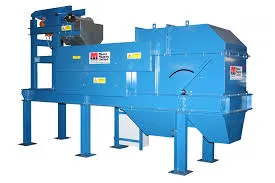

Nov . 20, 2024 04:03 Back to list
Understanding Industrial Shredder Prices
Industrial shredders play a crucial role in waste management and recycling processes. These robust machines are designed to shred various materials, including metals, plastics, wood, and paper, into smaller, manageable pieces. As industries become more environmentally conscious, the demand for industrial shredders has surged, leading to a significant focus on their pricing. This article will delve into the factors influencing industrial shredder prices and what potential buyers should consider.
Factors Influencing Industrial Shredder Prices
1. Type of Shredder There are several types of industrial shredders available—single-shaft, double-shaft, and granulators, among others. Single-shaft shredders are generally less expensive but may not handle larger volumes or tougher materials as efficiently as their multi-shaft counterparts. Understanding the specific needs of your operations is essential to determining which type will provide the best return on investment.
2. Material Quality and Construction The materials and construction of the shredder significantly impact its durability and efficiency. Machines made from high-quality steel or those treated to resist wear and tear cost more upfront but often have longer lifespans and require less maintenance. As a result, investing in higher-quality machines may prove more economical in the long run.
3. Size and Capacity Industrial shredders come in various sizes with different processing capacities. Larger and more powerful machines capable of shredding vast amounts of tough materials usually come with a higher price tag. When selecting a shredder, businesses must assess their throughput requirements to ensure they choose a model that balances capacity and cost-effectiveness.
4. Features and Technology The latest technological advancements have led to more efficient and automated shredding processes. Features such as noise reduction, dust collection systems, and advanced controls can increase the price significantly. While these features can improve operational efficiency and worker safety, buyers should weigh their necessity against the cost.

5. Brand Reputation Established brands often bring a higher price due to their reliability, after-sales service, and warranty offerings. While opting for a well-known brand may require a larger initial investment, the peace of mind and support may justify the expense, particularly for businesses that heavily rely on shredding operations.
6. Market Demand and Supply Like any other commodity, the price of industrial shredders can be influenced by the market's supply and demand. Economic factors, industry growth rates, and advancements in recycling technology can all play a role in pricing trends. Buyers should keep an eye on the market to make informed purchasing decisions.
7. Customization Options Many manufacturers offer customization options to suit specific operational needs, such as specialized blades or sizes. However, these customizations can increase the overall cost significantly. It’s crucial for buyers to evaluate whether these custom features will provide sufficient value before committing to the added expense.
Cost Breakdown and Budgeting
When considering an industrial shredder, businesses should not just look at the upfront cost. It’s vital to factor in ongoing operational costs, including electricity consumption, maintenance, and potential downtime. A more expensive but efficient machine could save costs over time, while a cheaper model might lead to higher operational expenses due to inefficiencies or frequent repairs.
Conclusion
Industrial shredder prices vary widely based on type, capacity, features, and brand. When budgeting for a new shredder, companies must consider not only the initial purchase cost but also the long-term operational expenses. By assessing factors like material quality, desired features, and market dynamics, businesses can make informed decisions that align with their operational needs and financial constraints. Investing wisely in industrial shredders will ultimately contribute to better waste management practices and a more sustainable business model.
Latest news
Troubleshooting Common Eddy Separator Problems
NewsJul.04,2025
The Role of Metal Recycling Plants in Circular Economy
NewsJul.04,2025
The Impact of Recycling Line Pickers on Waste Management Costs
NewsJul.04,2025
Safety Features Every Metal Shredder Should Have
NewsJul.04,2025
How Industrial Shredders Improve Waste Management Systems
NewsJul.04,2025
How Cable Granulators Contribute to Sustainable Recycling
NewsJul.04,2025